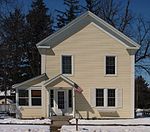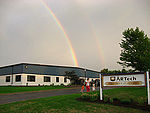Archibald Mill

The Archibald Mill was a water-powered gristmill complex, now reduced to ruins, on the Cannon River in Dundas, Minnesota, United States. The mill was founded in 1857 and expanded with a second mill across the river in 1870. It was the first U.S. mill to produce and market patent flour, and its "Dundas Straight" was once considered the best flour in the country. The Archibald Mill is associated with the introduction of hard spring wheat to Minnesota, and was one of the nation's first outfits to convert fully into a roller mill. The site is listed on the National Register of Historic Places for its national significance in commerce, industry, and flour milling.Today only the foundation of the 1857 mill remains, while the ruins of the 1870 mill stand on the river's edge near a trailhead for the Mill Towns Trail.
Excerpt from the Wikipedia article Archibald Mill (License: CC BY-SA 3.0, Authors, Images).Archibald Mill
Mill Towns State Trail,
Geographical coordinates (GPS) Address Nearby Places Show on map
Geographical coordinates (GPS)
| Latitude | Longitude |
|---|---|
| N 44.429722222222 ° | E -93.206388888889 ° |
Address
Archibald Mill Ruins
Mill Towns State Trail
Minnesota, United States
Open on Google Maps





